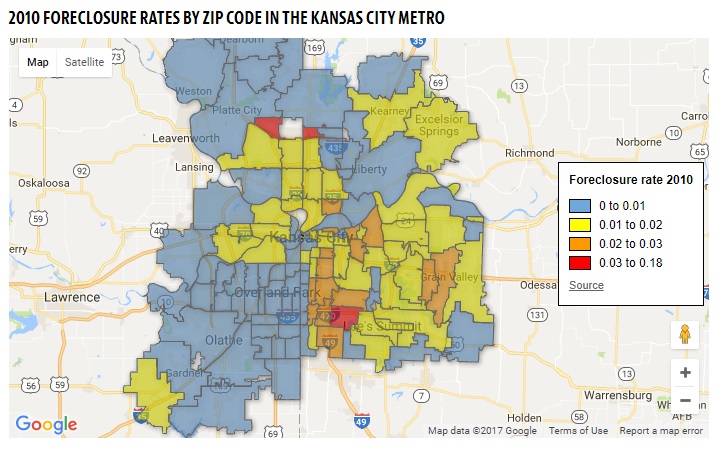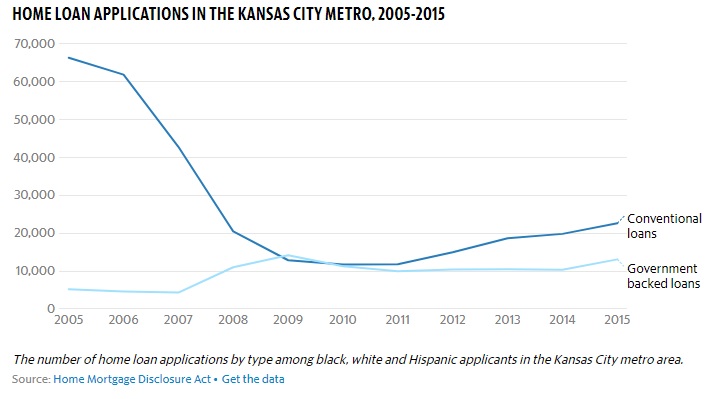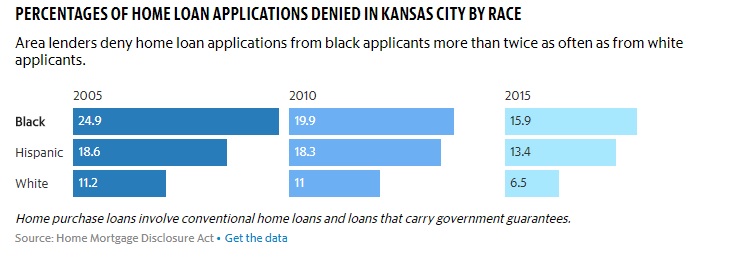JULY 09, 2017 7:00 AM
http://www.kansascity.com/news/local/article160229789.html
Michelle Coleman has never owned a home.
Ideally, she’d like a small house with a yard for gardening and room for her children and grandchildren to visit.
She lives in a four-plex in Kansas City for $600 a month, and hers is the only one that doesn’t have a working air conditioner — a big problem in July. She doesn’t want to spend her own money to fix the air conditioner, and of course her landlord still expects her to pay her rent even though it has not been fixed.
“I’m just tired of renting,” Coleman said.
“Any extra I get, I want to put into a home, not lining someone else’s pockets.”
She’s one of a growing number of African-Americans in Kansas City — and the nation — who don’t own a home.
Across the U.S., homeownership rates appear to be stabilizing as people rebound from the 2007 recession that left millions unemployed and home values underwater, according to a report by Harvard University’s Joint Center for Housing Studies.
But the report found African-Americans aren’t sharing in the recovery, even as whites, Asian-Americans and Latinos slowly see gains in home-buying. The center said the disparity between whites and blacks is at its highest in 70-plus years of data.
Experts say reasons for the lower homeownership rate range from historic underemployment and low wages to a recession-related foreclosure crisis that hit black communities particularly hard.

Homeownership rates among African-Americans in the Kansas City metro area slipped from an estimated 45.7 percent to an estimated 37.7 percent from 2005 to 2015, according to American Community Survey data analyzed by the Associated Press.
The data show that Kansas City is among the metros with the largest decreases in African-American homeownership percentages nationwide in areas with more than 25,000 African-American households.
In 2004, the pinnacle of U.S. homeownership, three-quarters of whites and nearly half of blacks in the country owned homes, according to the Harvard report.
By 2016, the national African-American homeowner rate had fallen to 42.2 percent and lagged 29.7 percentage points behind whites, nearly a percentage point higher than in 2015.
Now, a lack of affordable housing and stricter lending are making it harder for first-time buyers to obtain what traditionally has been considered an essential part of the American dream and a way to build wealth.
“It has always been historically and systemically harder for blacks, and we were seeing there a little bit of progress, and now we’re back at square one,” said Alanna McCargo, co-director of the Housing Finance Policy Center at the Urban Institute, a think tank focused on urban issues that published a similar report.
Low inventory is adding to the problem. The Star reported earlier this year that the country is seeing the biggest housing inventory crunch in 20 years, according to data gathered by Trulia, a real estate listing site. Kansas City had 55.4 percent fewer homes available from 2012 to 2017.
Darryl McKenzie said he’s always rented, but he would like to own a house.
“To me, a house is the best thing to have,” he said. “But there just don’t seem to be any houses available … and a lot of people just don’t have money to buy.”
Local housing experts point to after effects of the housing market crash that helped trigger the Great Recession in 2008, which left some racial minorities with poor credit and others wary of buying a house because of adjustable rate mortgages and other risky subprime loan products.
“A lot of minorities got into loans that were not good,” said Patricia Gilmore-Wilkins, executive director of the Greater Kansas City Housing Information Center. “They had bad loans, so a lot of them are still upside down.”
According to data from RealtyTrac, a real estate information company, pre-recession foreclosure rates were highest in the more diverse neighborhoods of Kansas City, but were still not as bad as during the recession. In 2010, the foreclosure rates in those diverse areas increased even higher, data show.
“The older I get, I keep thinking about leaving something behind for my kids,” said 46-year-old Willie Hill, an African-American Kansas Citian who said he’s always rented.
But putting together a downpayment for a house is difficult, he said.

Some experts say potential African-American buyers have reservations about entering the housing market because of questions and doubts about the process.
Research by the Federal National Mortgage Association, the government-sponsored mortgage securitization company better known as Freddie Mac, indicates few potential homebuyers know about pre-qualification education programs.
“One of the whys is education. Being educated on real estate: how to buy a home, how to take care of a home, what you need for credit, what counts for credit,” said Victor Frederick, president of the Kansas City chapter of the National Association of Black Real Estate Brokers. “The other thing is people were just scared off from trying to buy a home, and they can’t qualify. A lot of people couldn’t qualify after they raised the lending standards.
“Between the high unemployment, the skepticism and then the ruthless practices of some of the mortgage companies around here, those things combined cut down on the application levels, spoken from a realtor’s point of view.”
The total number of home loan applications in Kansas City fell between 2005 and 2015: by 80 percent for blacks, 52 percent for Hispanics, and 46 percent for whites, according to Home Mortgage Disclosure Act data.
“African-Americans don’t apply for mortgages at the same rates that whites do. Part of it is because of confidence, navigating the system, lack of information,” said Turner Pettway, president and chief executive of Neighborhood Housing Services of Kansas City Inc.
“If you don’t know a lot about the system, it’s very hard to learn by experience. It can be expensive.”
And when minorities do apply for home loans in Kansas City, there’s a history of being denied at higher rates than whites.
Income disparity among whites and minorities alone does not account for the gap between homeownership rates.
Data from the Home Mortgage Disclosure Act for Kansas City show that blacks who made 120 percent or more of the metro median income were still denied at rates twice that of whites.

Lenders say loans are not made solely on income, but also credit histories, debt burdens and net worth of applicants.
Cardelia Walker isn’t surprised to hear statistics describing lower homeownership rates among minorities. Walker, a licensed real estate agent in Kansas and Missouri, often works with clients in predominantly black communities.
She deals with clients who don’t often know the intricacies of applying for a mortgage. She stresses the merits of homebuyer education, while also acknowledging that the Great Recession has turned people off from the prospects of owning a home.
“It’s a lack of information, it’s a lack of knowledge, it’s a feeling that it’s so intimidating,” Walker said. “And it’s partly people who went through the crash who lost their homes. They’re the naysayers. They say you don’t want to go through that.”
The Associated Press contributed to this report.
Kelsey Ryan: 816-234-4852, @kelsey_ryan
Steve Vockrodt: 816-234-4277, @st_vockrodt
